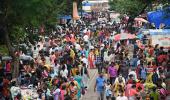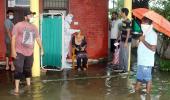Bad management, an exhausted government vigilance mechanism, delay in roping in private players, relaxing norms, and over-dependence on antigen tests may be the reason behind the surge, reports Shine Jacob.

From being held up as a model state for its Covid-19 control during the first wave of the pandemic, Kerala is contributing to nearly half the cases reported nationally, drawing criticism from experts and the Opposition on the way the state has tackled the second wave.
Union Health Minister Mansukh Mandaviya said the Centre would send a six-member high-level multidisciplinary team to the state to assess the situation there. The team will be headed by Dr S K Singh, director, National Centre for Disease Control.
The Prime Minister’s Office too expressed concern over the alarming rise in Covid cases in the state. To tackle the situation, the state government has announced a lockdown on the weekend (July 31-August 1).
Kerala, with an active case load of 1,54,000, is contributing 37.1 per cent of the active cases in the country, posting a rise of 72 per cent in the newly confirmed cases in the past seven days. The state has also reported a high case positivity of 12.93 per cent cumulatively and 11.97 per cent weekly. Around six districts are reporting more than 10 per cent weekly positivity.
On July 28, the state reported 22,129 cases, contributing to nearly 50 per cent of the 42,498 cases reported nationally, with an average test positivity rate of 12.35 per cent, which is several times higher than the national average of three per cent.
Experts indicate that bad management, an exhausted government vigilance mechanism, delay in roping in private players, relaxing norms, and over-dependence on antigen tests may be the reasons for this.
“The rise in cases is owing to flaws in government policies. They are allowing mass gatherings, conducting offline physical examinations, and lockdowns are being done on alternate days,” said Dr J A Jayalal, president of the Indian Medical Association.
According to experts, the major reason for the rising numbers may be the lower antibody prevalence of 42.7 per cent the state showed in the sero survey conducted by the Indian Council of Medical Research, as compared to 67.7 per cent nationally.
Opposition parties are alleging subdued reporting and a lower number of tests before the elections as major reasons for the drop in numbers during that time.
On April 6, when the state was going for the assembly elections, the number of cases reported in the state was as low as 59,051 and the number of newly reported cases was only 3,502 then. The number of tests increased to 196,902 on July 28, posting a two-fold rise.
Opposition parties allege that these numbers indicate that the lower numbers and the Kerala model public relations exercise were political gimmicks by the government targeting the elections.
“The number of cases was low in Kerala during that time because of the lower number of tests too. The entire Covid management of Kerala turned out to be a failure. They roped in the private sector only in October, because they wanted to take the entire credit. Because of this, the government sector health workers got exhausted due to overwork with no leaves,” said Dr S S Lal, a former official with the World Health Organization and an expert in public health.
Lal said more than 80 per cent of the doctors and nurses were in the private sector and 70 per cent of the patients too were dependent on such hospitals, so keeping them away from the Covid fight turned out to be a loophole in Kerala’s defence.
What is even more alarming is the rising number of Covid-related deaths. From mid-May, the state is consistently clocking over 100 deaths a day with the number touching 227 on June 6 and 131 on July 28. Lal added the state’s over-dependence on rapid antigen tests (70 per cent), while states like Tamil Nadu opted for 100 per cent RT-PCR tests, was also a reason for several cases getting undetected.
“Availability of vaccines too is an issue in Kerala,” Jayalal said.
So far, 37 per cent of the people in the state have got at least one dose of the vaccine.












 © 2025
© 2025